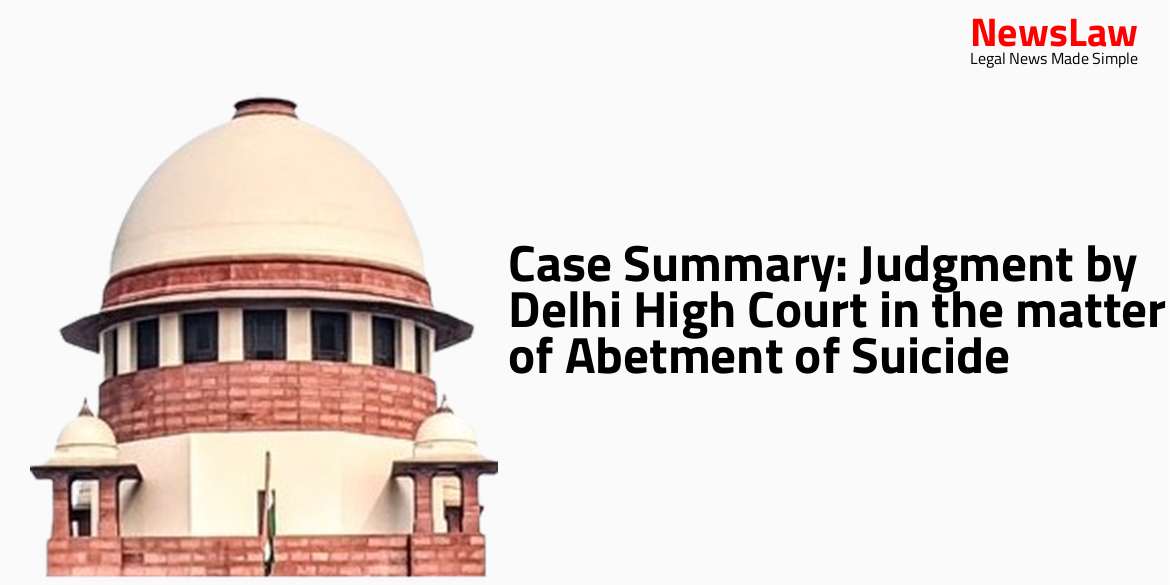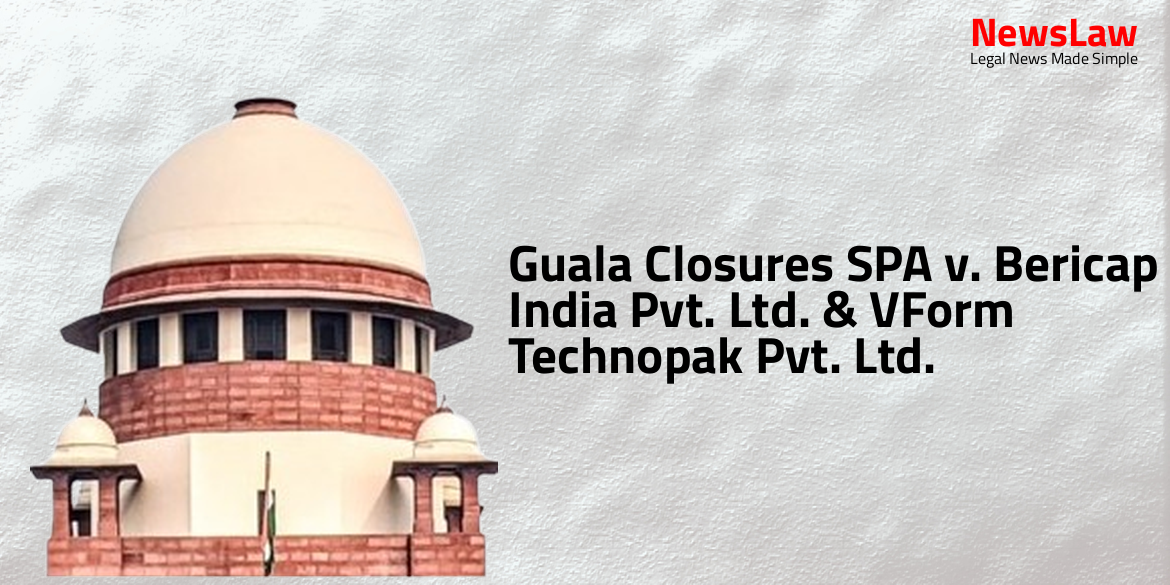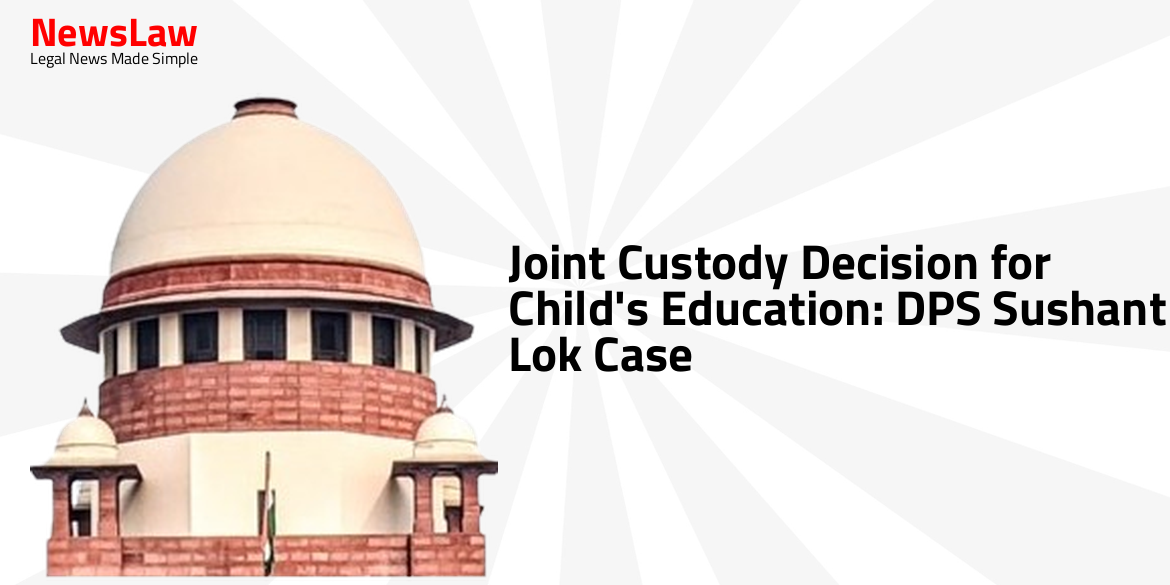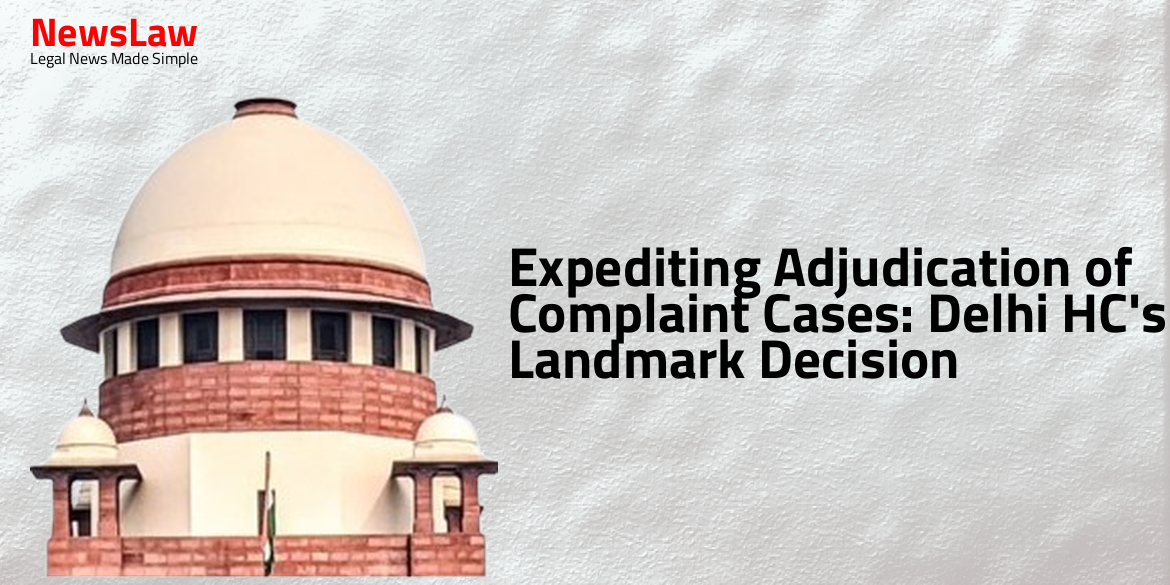A detailed analysis of a crucial judgment by the Delhi High Court regarding the matter of Abetment of Suicide is presented here. The Court’s decision in this case carries immense importance in the legal realm and sheds light on intricate aspects of the law. Stay tuned for a comprehensive overview of the proceedings and outcome.
Facts
- F.I.R. was registered based on the statement of Vijay Singh recorded before the SDM, Punjabi Bagh.
- Allegations included the husband threatening physical violence and having extramarital affairs.
- The SDM did not opine on the case being made out under Section 304B IPC.
- Trial court rejected key testimonies due to investigative lacunae and inconsistencies.
- Contention that there was sufficient evidence of cruelty leading to suicide was raised by the state.
- The father found the daughter dead after receiving information about her being ill.
- Charges under Section 304B IPC were registered against the accused based on findings at the scene.
- Charges under Sections 498A/306 of the IPC were framed by the Trial Court.
- The Trial Court acquitted the accused after completion of prosecution evidence.
- Trial Court noted that in the final inquest report, the SDM directed to register a case under section 498A IPC against accused Bharat Singh and his parents.
- The final report was dated 29-12-89, but the challan was submitted for trial on 10-8-89 and was committed to the Court of Sessions under section 304B IPC.
Analysis
- The prosecution case was primarily based on the statements of P.W.1 and P.W.5, the parents of the deceased.
- Material contradictions were found in the statements of P.W.1 and P.W.5, casting doubt on the reliability of their testimonies.
- The possibility of the deceased having an affair and disliking the accused was not completely dismissed.
- The marriage lasted only for about a month, and the deceased was very young.
- It was suggested that the deceased committed suicide due to being married against her wishes.
- There was no direct evidence of the accused instigating the deceased to commit suicide.
- The accused’s behavior did not seem sufficient to instigate the deceased to commit suicide.
- The cause of the deceased’s suicide could not be definitively ascertained.
- The Trial Court correctly observed that there was no evidence of a proximate cause for the deceased’s suicide.
- Interference by the appellate court with the judgment of acquittal was deemed unjustified if the trial court’s view was reasonable.
- Multiple discrepancies and contradictions in witness statements raised doubts about the case against the accused.
- The beating by the accused, even if true, could not necessarily be considered cruelty under Section 498A of the IPC.
- The Investigating Officer’s actions were criticized, suggesting pressure to implicate the accused.
- The appellate court usually refrains from disturbing the trial court’s factual findings in acquittal cases.
- The accusation of abetting suicide or causing cruelty under Section 498A of the IPC was not conclusively proven.
- The High Court’s reasons for reversing the conviction were found to be reasonable and not perverse.
- In cases of alleged abetment of suicide, there must be proof of direct or indirect acts of incitement to suicide.
- Before holding an accused guilty under Section 306 IPC, the court must scrupulously examine the facts and circumstances to determine if the victim was left with no choice but to end their life.
- The appellate court must consider that in cases of acquittal, there is a double presumption in favor of the accused.
- The accused’s actions must align with criteria detailed in Section 107 IPC for abetment.
- Instigation is defined as goading, urging, provoking, inciting, or encouraging to do an act.
- The instigation must be capable of inciting the consequence, indicating a certainty for the act.
- In cases where the accused created circumstances leading to suicide, instigation can be inferred.
- Mere words in the heat of the moment without intent may not amount to abetment of suicide.
- A charge under Section 306 IPC requires proof that the accused played a role in the suicide with intention or knowledge.
- The burden of proving guilt lies with the prosecution beyond reasonable doubt.
- In an appeal against acquittal, there is a presumption of innocence for the accused.
- The appellate court should not disturb an acquittal if two reasonable conclusions are possible based on evidence.
- Every individual reacts differently to situations, affecting their vulnerability to suicide.
- For conviction under Section 306 IPC, there must be direct or indirect acts of incitement to suicide.
- Without a positive act of instigation or aiding in suicide by the accused, conviction cannot be upheld.
- The court analyzed Section 306 IPC which requires an active role in abetting suicide.
- The act of instigation or facilitation must be present for the offense to be considered.
- The person accused of abetting suicide must have played a direct role in the act leading to suicide.
Decision
- The Court has held that if the view taken by the trial court is a ‘possible view’, the High Court should not reverse the acquittal to that of the conviction.
- There is no illegality, perversity, or mis-appreciation of facts in the impugned judgment passed by the Trial Court.
- The present appeal is dismissed and disposed of accordingly.
- Pending applications, if any, are also disposed of.
- Bail bonds stand discharged.
- The judgment will be uploaded on the website of the Court immediately.
Case Title: STATE Vs. BHARAT SINGH (2024:DHC:3891)
Case Number: CRL.A.-537/2003



